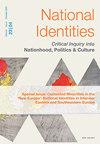同步民族主义——解读二元体系之间和之外的东南欧民族主义历史
IF 0.9
Q3 POLITICAL SCIENCE
引用次数: 1
摘要
摘要本文认为,将19世纪东南欧民族主义的演变历史化,不仅可以破坏对民族主义的二元理解,还可以破坏将单一理想类型作为民族主义的主导或排他性表现的本质主义具体化。它提请人们注意这一时期该地区可能遇到的相互竞争的民族主义,在空间和时间轴上各不相同,以及同一“国家”内某些群体对它们的支持。这篇文章挑战了时间滞后的概念,这是确定“东方”和“西方”之间根本区别的二元解释的组成部分。本文章由计算机程序翻译,如有差异,请以英文原文为准。
Synchronous nationalisms – reading the history of nationalism in South–Eastern Europe between and beyond the binaries
ABSTRACT This article argues that historicising the evolution of nineteenth century nationalisms in South-Eastern Europe allows us to undermine not only binary understandings of nationalism, but also the essentialist reification of a single ideal type as a dominant or exclusive manifestation of nationalism. It draws attention to the competing nationalisms that can be encountered in the area during this period, varying across the spatial and temporal axes, as well as in their espousal by certain groups within the same ‘nation’. The article challenges notions of a temporal lag, constitutive of binary interpretations that identify a fundamental difference between ‘East’ and ‘West’.
求助全文
通过发布文献求助,成功后即可免费获取论文全文。
去求助
来源期刊

NATIONAL IDENTITIES
POLITICAL SCIENCE-
CiteScore
1.70
自引率
0.00%
发文量
37
期刊介绍:
National Identities explores the formation and expression of national identity from antiquity to the present day. It examines the role in forging identity of cultural (language, architecture, music, gender, religion, the media, sport, encounters with "the other" etc.) and political (state forms, wars, boundaries) factors, by examining how these have been shaped and changed over time. The historical significance of "nation"in political and cultural terms is considered in relationship to other important and in some cases countervailing forms of identity such as religion, region, tribe or class. The focus is on identity, rather than on contingent political forms that may express it. The journal is not prescriptive or proscriptive in its approach.
 求助内容:
求助内容: 应助结果提醒方式:
应助结果提醒方式:


